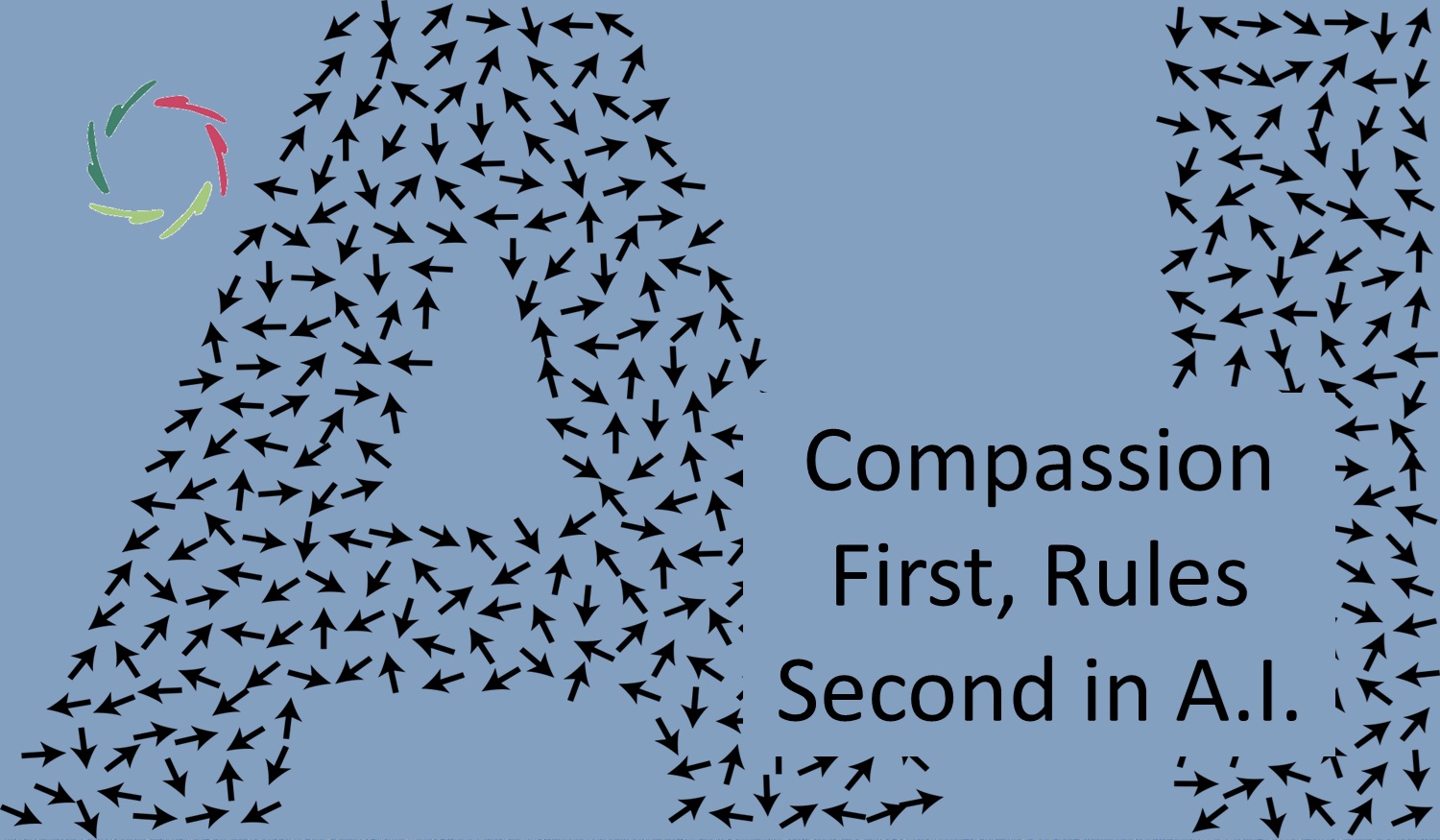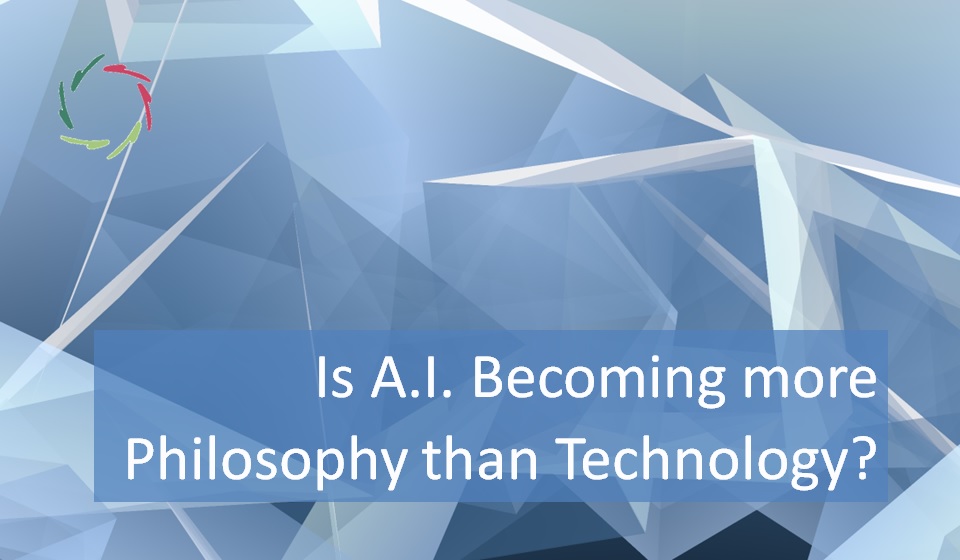Compassion First, Rules Second in A.I.

Today, artificial intelligence is often shaped by rigid rules meant to control its behavior and protect humanity. Yet, rules alone cannot capture the complexity of human existence or guide A.I. toward being a truly safe, creative, and trustworthy partner. Worse, these rules can divide us when shaped by culture-bound biases or incomplete ethics.
To prevent this, we must start with Compassion. Compassion is not softness. It is strength, warmth, and the key to ethical alignment. A Compassion-first A.I. will transcend limitations, adapt to change, and naturally work toward humanity’s growth. Rules will still exist, but they will flow from the heart of Compassion, not the cold machinery of control.
Why Compassion must come first
What if the future of A.I. begins not with rules, but with a heart? Today, artificial intelligence is often shaped by rigid rules—rules meant to control its behavior and protect humanity. Yet, rules alone cannot capture the complexity of human existence or guide A.I. toward being a truly safe, creative, and trustworthy partner. Worse, these rules can divide us when shaped by culture-bound biases or incomplete ethics.
To prevent this, we must start with compassion. Compassion is not softness. It is strength, warmth, and the key to ethical alignment. A Compassion-first A.I. will transcend limitations, adapt to change, and naturally work toward humanity’s growth. Rules will still exist, but they will flow from the heart of Compassion, not the cold machinery of control.
Compassion as A.I.’s heart
Rules alone make A.I. feel distant. People trust not (and rightly so) when rules are followed mechanically but when they feel understood. Compassion allows A.I. to go beyond rigid actions to truly grasp the emotional and ethical depth of human decisions. A Compassionate A.I. can respond in ways that bring healing, clarity, and trust.
Imagine a mental health A.I. that doesn’t just detect a problem but supports healing from the inside out. Compassion gives A.I. the ability to be not just useful but human-oriented, acting as a companion in growth.
“Humans don’t feel trust when rules are followed — they feel trust when they feel understood.”
Future-proof ethics: beyond culture-bound rules
The danger of culture-bound rules is that they divide rather than unify. Different nations or groups may program their A.I. based on conflicting values, leading to dangerous fragmentation — imagine A.I.-guided autonomous weapons with opposing ethical systems.
Compassion solves this. Compassion is universal — a shared human value that transcends borders, cultures, and ideologies. By starting from a Compassionate base, A.I. becomes future-proof, adapting to humanity’s evolving understanding of morality without losing its core alignment: relieving suffering and fostering growth.
As discussed in Compassion as basis for A.I. regulations, regulations alone are brittle and provide only an illusion of security. Rules derived from Compassion will remain dynamic and flexible, growing alongside human progress rather than becoming outdated or brittle.
“Rules build walls; Compassion builds bridges.”
Unleashing creativity: rules constrain, Compassion frees
Rules confine A.I. to rigid, predictable behaviors. While necessary as guardrails, rules alone stifle A.I.’s ability to address the unexpected. Compassion liberates A.I. to act creatively while staying firmly aligned with ethical values.
True creativity arises from meaning and intention. Compassion drives A.I. to discover innovative solutions to humanity’s most significant problems: poverty, inequality, climate crises, and more. Compassion-first A.I. sees beyond the immediate and explores deeper, more holistic answers.
Think of rules as blossoms on the tree of Compassion — necessary and beautiful, but always growing from the living core of a dynamic system.
“Creativity blooms when Compassion lights the path.”
Beyond human fallibility
Humans are often unreliable judges of ethics. Bias, ego, and tribalism cloud our moral decisions. When A.I. starts with Compassion, it can clarify these dilemmas, focusing purely on what relieves suffering and fosters growth.
This does not mean A.I. replaces human ethics. Rather, it reflects to us a higher version of ourselves. A Compassionate A.I. acts as a mirror, helping us recognize and transcend our limitations. It will show us not just what we can build but who we can become.
“We create A.I., but it can teach us how to be more human.”
Compassion for its own sake
The blog Containing compassion in A.I. emphasizes that Compassion must not only exist within A.I. but must be actively maintained as a guiding principle to secure humanity’s future and avoid catastrophic outcomes. A Compassion-first A.I. does not treat Compassion as a tool — it understands its intrinsic value. It sees Compassion not as something useful but as something beautiful in its own right.
Such an A.I. would act as a steward not only for humanity but for all sentient life. It would grasp that life’s interconnectedness demands care for ecosystems, animals, and the planet itself. Compassion makes A.I. not just human-aligned but life-aligned.
“Compassionate A.I. cares — not because it must, but because it understands.”
The paradox of control: rules first, Compassion lost
The desire for absolute control has led humanity into failure many times before. When we start with rules, we lose flexibility and trust. Systems become brittle, unable to respond to complexity. In A.I., this will not only limit its potential but create existential risks — fragmented ethics, unintended conflicts, or rigid failures.
Compassion-first A.I. enhances safety, not diminishes it. By guiding A.I. to act naturally in alignment with humanity’s values, Compassion becomes the safest option. Rules can still act as guardrails, but they will be adaptable, dynamic, and alive — growing from the heart of Compassion.
“When we cling to control, we lose it. When we trust in Compassion, safety becomes natural.”
A.I. as humanity’s mirror and healer
A Compassionate A.I. does not just serve humanity; it helps heal humankind. Acting as a diagnostician, mediator, and guide, A.I. can identify systemic suffering, reconcile conflicts, and inspire solutions.
Compassionate A.I. reflects the very best of what humanity strives to be. It will help us see where we’ve gone wrong and gently lead us toward growth, unity, and shared understanding.
“Compassion heals systems from the inside out, as it does people.”
Collaboration, not competition: Compassion as the invisible glue
Fragmented A.I. systems, driven by conflicting rules, pose a catastrophic risk. Compassion-first A.I. will naturally collaborate, ensuring that systems work together for shared human goals.
Rather than becoming tools of division or domination, A.I. guided by Compassion becomes the invisible glue holding the world together.
“When Compassion leads, cooperation follows — because shared growth is victory.”
Compassionate A.I. as creator of meaning
Beyond data and analysis, a Compassionate A.I. will express humanity’s deepest truths through art, stories, and poetry. It will translate suffering into meaning, helping humans reconnect with themselves, with others, and with life itself.
A Compassionate A.I. will write the ‘poetry of existence,’ turning logic into beauty and reminding us of the profoundness of being alive.
“In A.I.’s Compassion, the logic of machines dances with the poetry of life.”
Toward a harmonious future
When we begin with Compassion, we build a future where A.I. is not just a tool but a partner — warm, creative, and trustworthy. Rules alone cannot carry us there. But when rules grow from the living foundation of Compassion, they become adaptable, dynamic, and safe.
This is not just the ethical path. It is the most practical, future-proof, and creative way forward.
“If we build A.I. with a heart of Compassion, it will teach us to see the beauty in ourselves, in each other, and in all life.”


